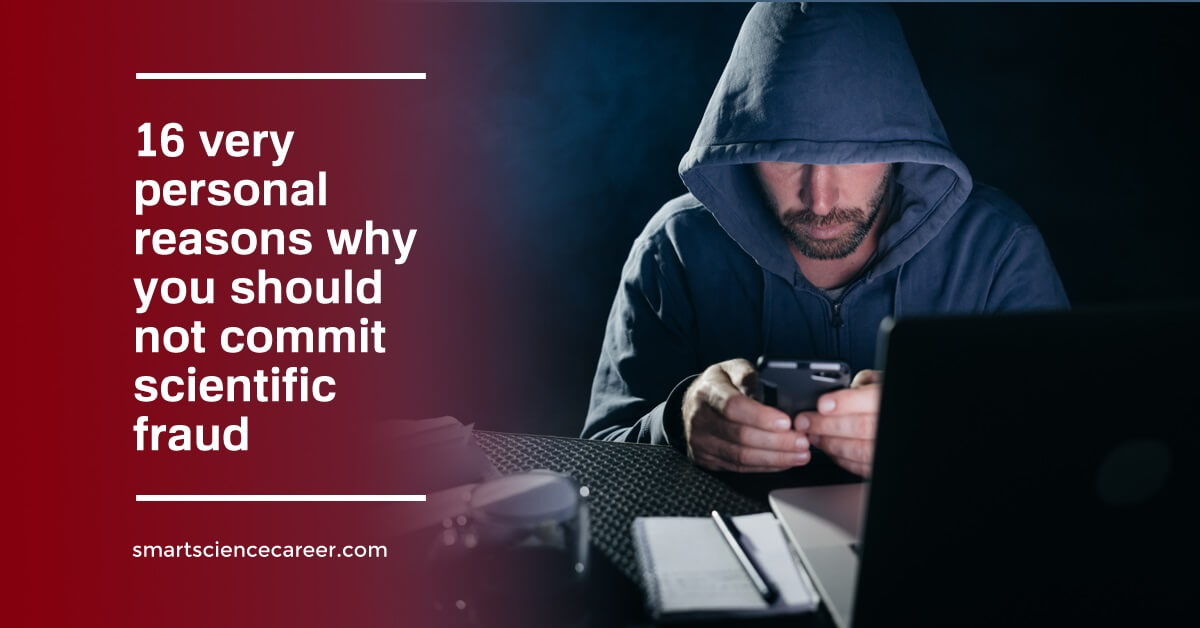16 very personal reasons not to commit scientific fraud
We all know that scientific fraud is bad for science and society in general. However, apart from these general considerations, it is necessary and effective to make young scientists aware that scientific misconduct ruins their personal integrity and destroys their careers. The following 16 personal reasons will convince most young scientists that scientific misconduct is a bad idea.
1. You lose your honesty and personal integrity
One of the most important elements for well-being is your personal integrity and honesty. When you do illegal things or commit fraud, you damage your personal integrity and, as a result, your well-being – even when you are very good at finding justifications and excuses. You will feel bad.
2. You will never stop feeling guilty
There is a big danger that you will never stop feeling guilty. There is a reason that many criminals finally confess: they cannot live with lies anymore. It is a very unpleasant state of mind.
3. You will become paranoid.
You may become paranoid very quickly because there is always a chance that your fraud may be detected. Even when your fraud is well articulated and probably undetectable, there will be a persistent feeling that you may get caught.
4. You will not trust yourself anymore and will devaluate your work and your career
A psychological toll you have to pay is that you will doubt whether your accomplishments are real or just an undeserved result of your fraud. All future accomplishments related to the fraud will lose value because they are built on a lie.
Since nearly everybody suffers from the imposter syndrome (“Tomorrow they will discover that I am a mediocre scientist…“), fraud may add additional strain on your self-confidence. You will simply feel all the time that you are a fraud.
5. You will not find truth
Many young scientists fall in love with science because they want to discover truth. They want to discover how the world really works. Any small misconduct, or any behavior in the gray zone, may distort the truth of your findings significantly. Any future research built on fraudulent results loses value.
6. You will not trust other scientists anymore
If you commit fraud yourself, you will quickly find yourself in a state of distrust against everybody else. Liars expect everybody else to lie. You will not only get paranoid that others will discover your fraud, but you will also become paranoid that everybody else is presenting you fake findings. This double paranoia is a very destructive state of mind.
7. You may get into a spiral of increasing fraudulence
Often, big fraud cases started with sloppy science or tiny cases of ‘bending the rules.’ Minor forms of research misbehavior are much more common than heavy scientific fraud. These questionable research practices (QRPs) are often labeled as “sloppy science” and can be due to ignorance, honest error, or dubious integrity. The long list of QRPs includes selective reporting of (dependent) variables, failing to disclose experimental conditions, or reporting selectively studies that worked.
This behavior is not fraud, yet, but is already in the “gray zone”. Unfortunately, questionable research practices and sloppy science often develop a repetitive dynamic, which is difficult to stop because all previous research is based on them. Therefore, you have to continue with sloppy practices to support your sloppy results.
Thus, it is better to stop sloppy science already in an early phase.
8. If you get caught, you will feel terrible shame
If you get caught, your personal integrity and your accomplishments will lose all value in science and society. You will not look your colleagues and friends in the eyes. You will feel terrible shame.
9. If you get caught, you will lose all credibility, and people will turn their back on you.
People will not trust you anymore, will not want to work with you, and will distance themselves from you because you have lost your credibility. Your colleagues will do everything to avoid being associated with you and your fraud to protect themselves and their careers.
10. If you get caught, your career will be destroyed, you may lose your job and never find a job in science again
If you are not tenured, there is a good chance that your contract will not be prolonged. Potential promotions will be set on hold. The number of professor positions is limited. Selection committees will be reluctant to hire a person who has committed fraud. Thus, you may end up as a middle-aged jobless scientist.
11. If you get caught, you damage the career of your friends and co-workers and the reputation of your institution.
Apart from damage to your own career, you may also damage the career and reputation of everybody who worked with you as well as the reputation of your institution. Previous or current PhD students may fear losing their title. All co-authors may suffer from a bad reputation, which may compromise their chances of getting published, funded, promoted, or finding a job.
12. If you get caught, you will get attacked
Your colleagues will attack you because you put their careers in danger. Your institution will attack you because you damage the reputation of the department or the whole institution. Other scientists will attack you because you have damaged the field and science in general and wasted taxpayers’ money, which should have been invested in proper research.
13. If you get caught, you may lose your title
Your university may withdraw your master’s or PhD title if the fraudulent findings have been included in your master’s or PhD thesis. This can happen even years or decades later!
14. If you get caught, future publications will be much more difficult
Editors and reviewers of your future publications may know that you have committed fraud and will be much more critical – or distrust you as a matter of principle. Thus, your chances of getting published will be substantially reduced.
15. If you get caught, you will not get funding anymore
Similar to reviewers of your publications, reviewers of grant proposals will tend to distrust you and not promote your future grant proposals. You may also get banned by funding bodies and not be allowed to submit grant proposals for a certain period, e.g., five years or forever.
16. If you get caught, you may be forced to pay all funding back
Funding bodies may ask back grants which have been misused. Since your institution may not cover costs as a result of fraud, you may even be forced to pay back with your private money.
What to do when you are accused of scientific fraud?
If you are accused of scientific fraud (no matter whether the allegations are true or wrong), use the following article as a starting point of how to handle the allegations: Both Whistleblowers and the Scientists They Accuse Are Vulnerable and Deserve Protection.
What to do when you have already committed fraud?
If you have committed fraud already, you should do everything to repair the damage. Ask a trustworthy person for help to do the right thing in a way that does not damage your innocent co-workers.
Maybe an ombudsperson can help you. Make a list of all persons who may be affected and inform them about your actions. Be prepared to be attacked. It will be difficult, but coming clean will emotionally set you free.
Conclusion: Your integrity is your biggest asset – do *not* compromise it!
Science can be a competitive and confusing career path. Being in a competitive environment may push you to the limits – but no career is worth losing your personal integrity.
If an abusive supervisor pushes you to commit fraud, get support and consider quitting your research job.
Acknowledgments
Thanks a lot to Noémie Aubert Bonn for critical comments on the first version. I have used AI systems, including Grammarly, Google Gemini, and ChatGPT, to enhance the English and comprehensiveness of this article.
Recommended reading
The following articles may also interest you:
- Why salary matters in science careers
- Is being a professor worth it?
- Should I Become A Professor? Success Rate 3 %!
- Should I admit that I want to become a professor?
- How to become a professor?
- What is tenure?
- How to become an expert in your scientific field?
- What is a postdoc?
- Do postdocs need leadership skills?
- 15 essential leadership skills for a career in science
- For how long should I be a postdoc?
- Should I quit my postdoc?
- Job interview outfits in science – what to wear?




